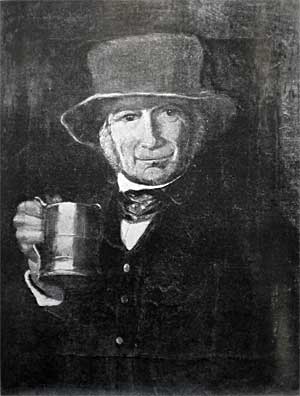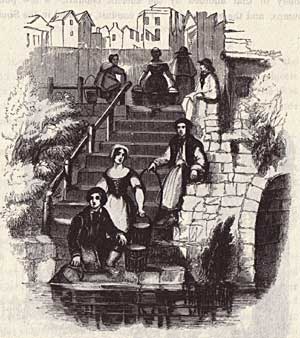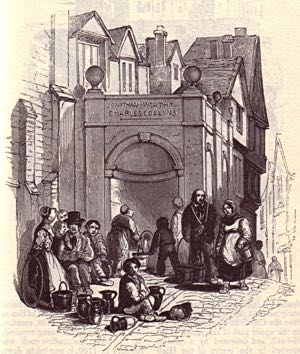
Exeter Stories
Exeter folk and friends in their own words - │ << Previous story │ Next story >> │
Various - memories of Exeter's water carriers in the 1840's
W. H. D.
The water carriers in Exeter sixty years ago were quite an institution. Many aged and crippled men, and some women, got their living by selling water. They got a pair of shafts, very second hand, and wheels discarded from a coach or cart, often not pairs or near it, and a cask pitched all over to make it hold water. The pony, horse or ass was as ancient as the carriage, certainly it would now attract the attention of an officer of the R.S.P.C.A. at the present day.
When a poor fellow was down on his luck a collection was made and 40 shillings would set him up as a respectable water carrier. The trade certainly cheated the dogs of the food.
The principal place for dipping the water was the opening to the river just below Exe Bridge by Bradbeer's brush factory. Here several of them could be seen at a time filling their barrels; they drove into the river to the belly of the beast; they used a long pole with a tin can fixed to the end. In winter the ice had to be broken before they could fill their casks, which soon got covered with ice. When the river was in flood they could not go into the river, although some did to their cost. The water, too, was dirty. To get the cart up the steep incline of Exe Bridge was painful work; if the man had a family, wife and children had to work at it, and the blows on the beast were neither light of few.
The water was soft and used for washing; it was sold for a half-penny a bucket or three buckets a penny. The receipts for one turn might range from 6d. to 8d., and four turns a day would be a good day's work. I remember the cry, "Walthur, walthur, three buckets a penny." They also dipped water out of the leat at the bottom of Exe Street.
When the new Water Company supplied water at 3d. per week the sun of the water carriers set. The horse or ass died, the cart and cask were burnt, and the man retired to the mansion on the hill, on his road to even a better one than that, we trust.
Mr Vickers of Topsham, an aged gentleman
Billy lived in Broadstones (this is now West Street, the continuation of Coombe Street to West Quarter, and looks directly across unimpeded to Haldon). He was by trade a mason, and his son likewise.
Brookman lived in Exe Lane, and fetched his water in a barrel from the Exe at Exe Bridge triangle and sold it at ½d. per bucket.
Naughty boys used to play him tricks and pull the plug out of the barrel while he was away delivering his sold bucketfuls.
Mr Ellis, plumber, Friernhay Street
Ackland used to supply Holy Trinity parish and district—living in Chudley's Court at the bottom of Coombe Street, and taking his water at the, then called, dipping steps from the mill leat behind and above the Custom House.
The road was some 10 to 12 feet above the water, which came down mostly in turbulent fashion, caused by the mill wheel and fall about 150 feet further up the stream.
About 2 feet below the Dipping place the public sewer ran into the leat.
Ackland used the barrel on the wheels.
Of Arthur Moore I only learn his name.
The writer has personal memory of Jimmy Patridge (Partridge), who, with his father Sam, lived on water selling and charity.
Jimmy and his father, too, were somewhat of simpletons - but both accredited, by folk of the day, as being more 'R than F.'
Jimmy in the late forties was cared for by the Rev. Fisher Turner, then occupying Priory House, next the Salvation Army Temple; and having written thus much, I begin to ask myself what my position was when Jimmy was being eased? Was I the good boy—shocked? Did I look on amused, or did I chime in?
This man dipped and carried away two buckets at a time, using a hoop to keep his arms extended.
Mr J Hooper, 33 Paris Street
I well remember seeing the water barrels being filled at the Exeter Quay and near the sawpits in the Bonhay, now the Pleasure ground.
Father Napper was the water carrier for St. Thomas. My grandmother, a laundress, used to get her supply from him at three buckets a penny, at weekly cost of half-a-crown. Further supplies were procured by the women fetching the water from the river, using two buckets and a hoop.
At that time water ran in the gutters on each side of Cowick Street, and I remember when the pump was dry dipping up the water from these gutters in a bucket to put into a tub to settle, to be used for household purposes.
Mr W J J Norton of 185, S. Sidwell Street
I am sorry I cannot give you the information you requires about Billy Wotton, and this, I suppose, is the reason why. There were more than one of these celebrities in this city, and each had his daily rounds. Wotton's I think, must have been the lower part of the city, as the upper part (S Sidwell's) was supplied by Jimmy Goss, who was always accompanied on his rounds by his son - a very tall, lanky fellow, who was daft. This Goss lived in Black Boy Road in the court just above the George and Dragon. And as it was he who supplied the water to the house in which I lived in S. Sidwell's some 60 or 70 years ago, I have of course a more personal recollection of him than I have of Wotton.
The street cry of these 'watermen' (as they were called) was 'Wat-ter,' and their price was generally ½d. a bucket or three buckets a penny. But as in most other business matters, it was a case of "supply and demand." For in times of drought, in the summer, and in mid-winter, when they had to break the ice to dip the water, they would charge 1d. a bucket. Housekeepers were not solely dependent on these watermen for their supply of water for washing, as many houses had a provision for storing the rain water from the roofs, but in dry seasons they of course ran short, and it was then they had to pay one penny a bucket for their supply.
For several years after the establishment of the Water Company in Exeter, the "Waterman" plied their trade, but when the Council made it compulsory that all houses should have an efficient water supply for flushing and other sanitary purposes, of course was a case of "Othello's occupation's gone."
Water for drinking or cooking purposes was obtained from pumps and wells. Of course, that obtained from the "waterman" was totally unfit for this purpose, as you may imagine from the sources from which it was obtained - the ordinary dipping places being at the back of the Custom house, Engine Bridge, and Shooting Marsh Stile, each being close to a sewage outfall.
Compiled by G L Boundy.
REMINISCENCES OF EXETER.
Two men watering the streets with malt scoops. The water being ponded buck by canvas and a piece of wood. The water was forced up into the city from Engine bridge by wheel and machinery—the property of the late James Golsworthy, Esq. Fire plugs were first laid down in 1822 by the West of England Insurance Company who subscribed £200 towards it. Twenty to thirty water-carts were drawn daily through the High-street by horses and donkeys, the water being dipped from the Exe, behind Mr. Bradbeer's, brushmaker, and retailed at halfpenny per bucket or three for a penny. The lower part of the city was supplied by men carrying two buckets with a hoop, and a piece of wood floating to prevent waste, two buckets for a halfpenny.
After heavy rain in the hilly streets, boys searching in the gutters for nails and pieces of iron, it being the wonder from whence they came—I have seen their caps half full. During heavy rain, tubs and every available utensil put in the streets to catch the water. Twenty to thirty people waiting at the conduit in South-street for their turn for water—the supply at times was so limited that it would take half an hour to fill a bucket or pitcher, and parties had frequently to wait three or four hours for it. Many people may not know why the above was so appreciated; it was considered the best for tea and pea-soup. It came from the Lion's Holt spring, and flowed through a pipe down the High street in a subterranean passage, and the pipes were examined by opening trap doors, and men descending with a lantern; the only trap that I am aware of in High street is one in front of Mrs. Stone's, jeweller, adjoining the kerb.
These memories of the water carriers of Exeter were recorded by G. L. Boundy in 1901 and published in Devon and Cornwall, Notes and Queries. The memories are of the 1830's and 40's, at the end of the era of the water carrier, when Exeter was installing its first, proper, piped water system. Thanks to the Westcountry Studies Library. The last memory, Reminicences of Exeter, is from James Cossin and was published in 1877.
 Billy Wotton, water seller -
mentioned in the memories of Mr Vickers
and Mr Norton.
Billy Wotton, water seller -
mentioned in the memories of Mr Vickers
and Mr Norton.  Dipping at the leat, by John
Gendall for Thomas Shapter's
1848 report on the
cholera outbreak. Notice the woman at the top of the steps using a
hoop, and the woman holding a hoop, as described in Mr Hooper's memory.
Dipping at the leat, by John
Gendall for Thomas Shapter's
1848 report on the
cholera outbreak. Notice the woman at the top of the steps using a
hoop, and the woman holding a hoop, as described in Mr Hooper's memory.
 The South Street conduit. See The Great Conduit.
The South Street conduit. See The Great Conduit.
│ Top of Page │